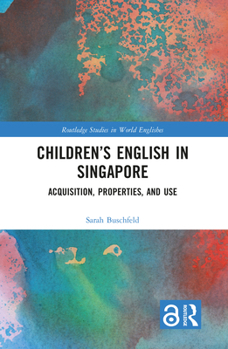Children's English in Singapore: Acquisition, Properties, and Use
(Part of the Routledge Studies in World Englishes Series)
Combining the World Englishes framework with First Language Acquisition methodology, this book investigates children's acquisition of L1 English in the context of multilingual Singapore, one of the traditional Kachruvian Outer Circle or ESL countries.
The book investigates language choice, use, and dominance in Singaporean families, identifies common linguistic characteristics of L1 Singapore English, as well as the acquisitional route that Singaporean children take. It discusses characteristics at the different levels of language organization, i.e., phonological, morphosyntactic, lexical, and pragmatic features, drawing on a variety of systematically elicited data and Praat-based acoustic analyses. Comparing the results to similar data obtained from children living in England (both mono- and bi-/multilingual), the book also sheds light on how the acquisitional steps taken by Singaporean children differ from or are similar to traditional native speakers of English and children from immigrant families in England.





